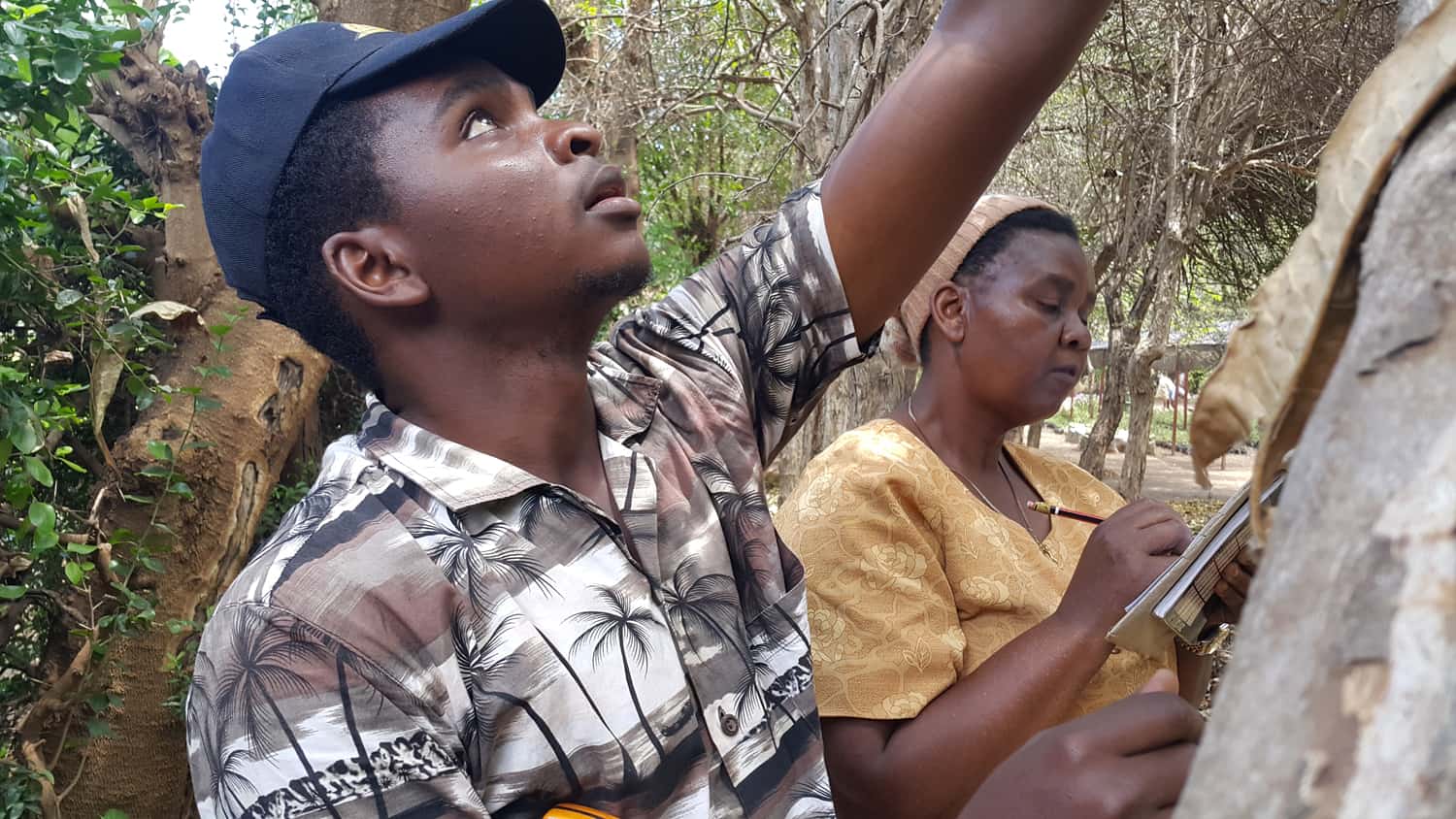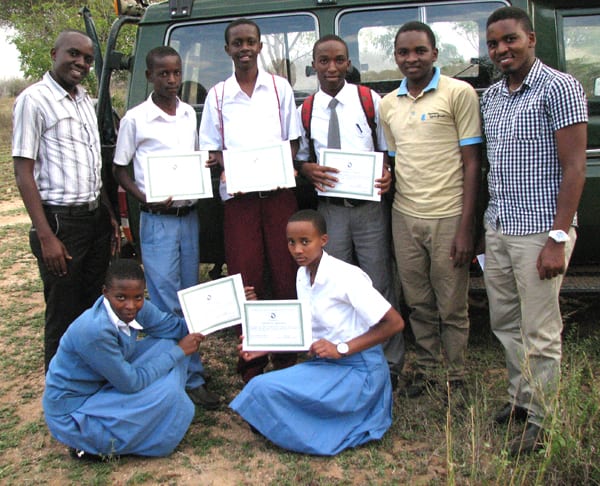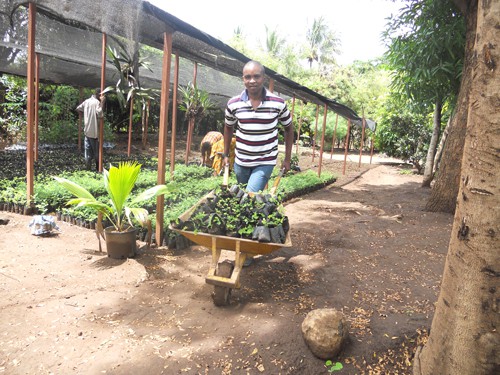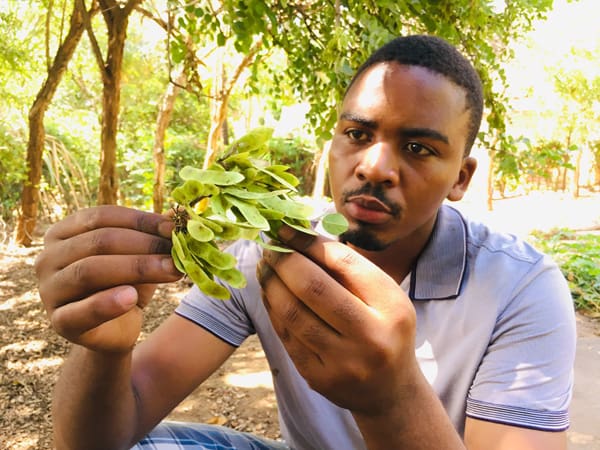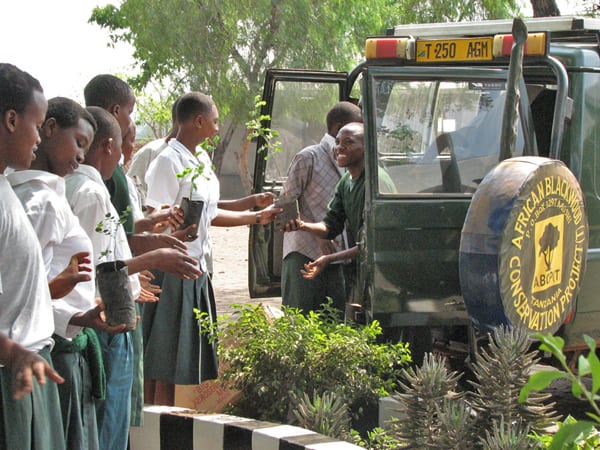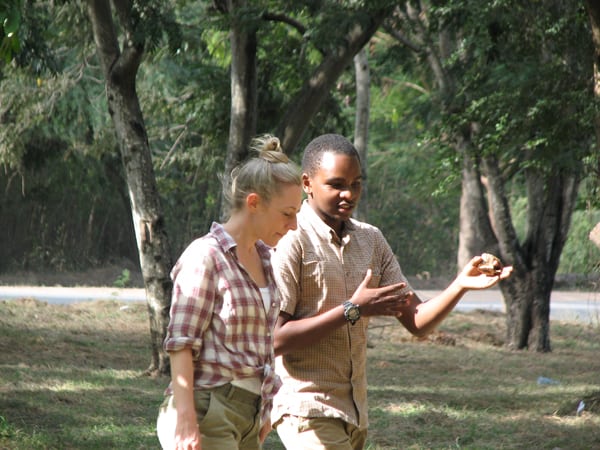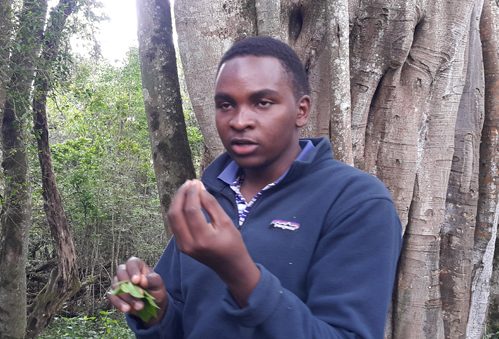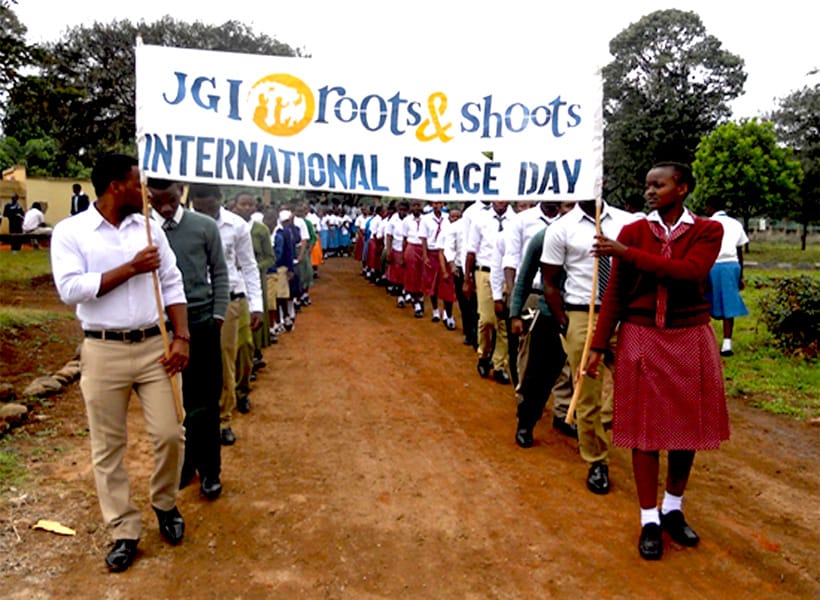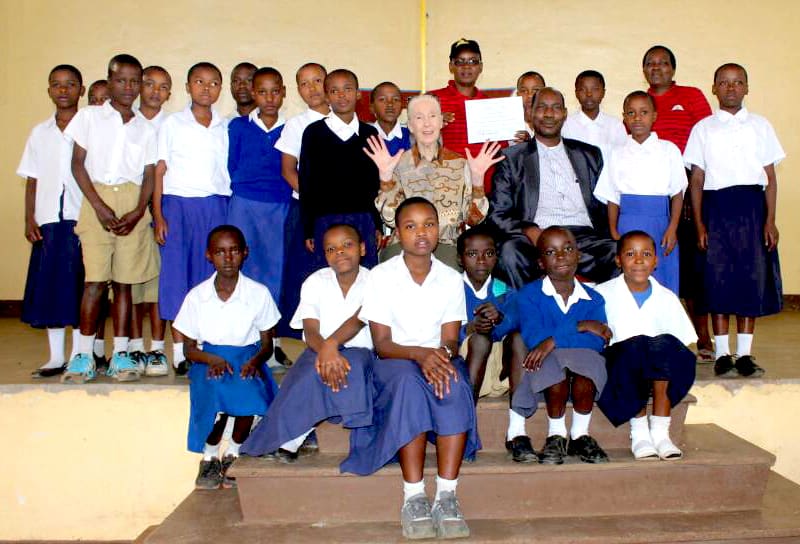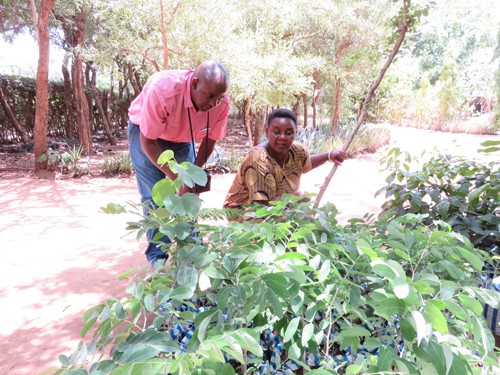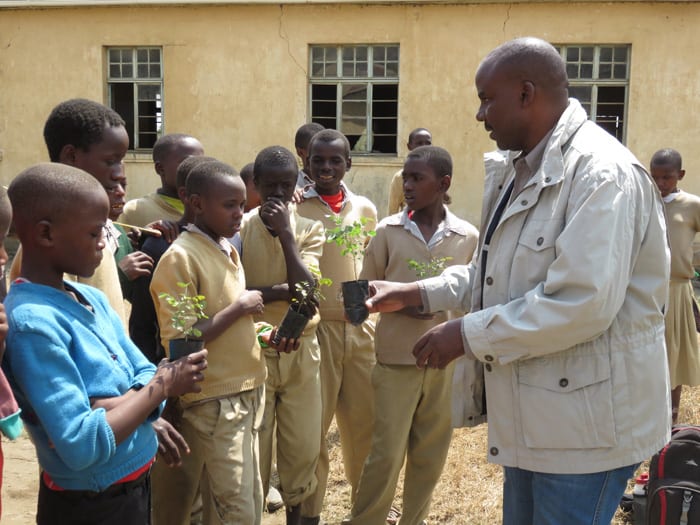THE PEOPLE
Michael Chuwa (l) and Cyril Chuwa (r) with Spanish soil scientist Hector Crehuet at the Moshi Mpingo Plot.
The People Behind The Project
ABCP Directors - Michael and Cyril Chuwa
Michael and Cyril Chuwa are the Tanzanian directors of the ABCP. Michael has a degree in Information Technology from the University of Iringa in southern Tanzania and is using his Internet skills for educational outreach and advocacy for environmental conservation. Cyril Chuwa has a diploma in Wildlife Management from the College of African Wildlife Management in Moshi, where he studied botany, zoology, park management and ecosystem restoration. He is currently employed as a conservation assistant at Ngorongoro Conservation Area.
Michael and Cyril oversee the work of seedling production at the Moshi Mpingo nursery and initiate outreach to schools and community groups to arrange cooperative endeavors for tree planting and educational instruction. They also work with youth conservation groups such as Roots and Shoots, which was established by Jane Goodall in 1991 to inspire students to initiate projects to solve environmental problems in their own communities. The ABCP nursery provides tree seedlings for projects and ceremonies initiated by such groups. As the sons of the founders of the ABCP in Tanzania, Sebastian and Elizabeth Chuwa, since childhood Michael and Cyril have learned the science and art of tree cultivation at the Chuwa home nursery and the ABCP Mpingo Plot, and are now continuing in the tradition of working through schools and civil institutions to raise awareness for environmental conservation and ecosystem renewal.
Three generations of the Chuwa family have been active in teaching principles of conservation to Kilimanjaro communities. Michael and Cyril’s grandfather, Michael Iwaku Chuwa, was an accomplished herbalist who taught his neighbors the science of deriving medicinal remedies from the plant species on the mountain. Their father, Sebastian Chuwa, followed in this path by instituting numerous programs designed to work in tandem to both conserve the natural ecology and enhance human welfare. Michael and Cyril are bringing conservation into the modern era and continuing in the important work of their forerunners in their ancestral homeland of Mt. Kilimanjaro.
ABCP Co-Director - Elizabeth Chuwa
Elizabeth Chuwa, as the Principal of Sungu Primary School located on Mt. Kilimanjaro, has taken a leading role in introducing environmental studies into schools in the Moshi area, working with her fellow teachers in designing new curriculum subjects and activities to involve both students and parents in tree planting programs, recycling, environmental beautification and in establishing youth conservation groups.
She has been instrumental in the outreach work of the ABCP by placing a special emphasis on the importance of the African blackwood tree to the ecology and economy of Africa, raising awareness about the species and spearheading active outreach efforts to encourage schools, churches and public institutions to join in educational and replanting projects for its future survival. By means of such efforts, Tanzanian school children and adults are becoming more aware of conservation and are actively participating in grassroots efforts to heal the environment and protect the area’s threatened species.
2014 Elizabeth was the guest of honor at a Roots and Shoots annual event celebrating the UN International Day of Peace (above left), and addressed the gathering about the importance of activity-based programs in protecting the environment as a way to enhance positive community cooperation. In 2017 she was presented with a certificate by Jane Goodall to honor her many years of commitment to youth conservation (above right, Elizabeth at top center holding certificates, is surrounded by her students). (Center) Jane Goodall plants mpingo seedling from the ABCP nursery on the grounds of Mweka College of Wildlife Management in Moshi.
ABCP Co-Director - Dismas Macha
Dismas Macha has been acting as a Director of the ABCP since 2014. In this position he assists with activities at the Moshi Mpingo Plot and arranges outreach programs to find suitable planting locations for its tree seedlings. His botanical knowledge and direct experience in community conservation projects bring a wealth of expertise and commitment to the ABCP.
Dismas has a Bachelor of Science degree in Natural Resource Management from Egerton University in Kenya and is currently working towards his Master’s degree in the same field. Since 1990 he has worked at Ngorongoro Conservation Area (NCA) where he oversees the management of botanical species within the park. In 2018 Dismas assumed a post as head of the research section in the NCA Department of Research Development and Monitoring. In this capacity he works with research experts from government institutions to plan and institute nature-based programs for managing invasive plant species, evaluation and management of land cover dynamics and the development of plant checklists for the park.
Dismas is well equipped for this position because for many years he has studied and collected NCA plant species for its central herbarium and implemented programs for the restoration of degraded ecosystems within the park.
He also works with communities adjacent to the park boundaries, teaching villagers about environmental conservation, promoting fuel-saving technologies to reduce the use of charcoal and wood fuel, and establishing tree nurseries and tree planting projects. The NCA itself operates a central nursery at Karatu that produces 50,000 seedlings a year. By distributing these seedlings Dismas is helping villages to plant species that preserve local environments and supply domestic needs for fuelwood, medicines, food and shade. This establishes good community relations, boosts local economies, restores the environment and reduces impingement on Ngorongoro protected areas.
The NCA is one of Tanzania’s most important protected areas and tourist destinations. It is a designated World Heritage Site and International Biosphere Reserve and is sometimes called one of the wonders of the world because of its unique topological features and abundant wildlife. Its most striking feature is Ngorongoro Crater, the world’s largest extinct volcanic caldera, measuring 10-12 miles in diameter. This unique habitat harbors a resident population of 25,000 large animals including Cape buffalo, hippopotamus, black rhinoceros, cheetah, leopard and one of the largest lion populations in the world. To the east of the Crater is the Serengeti, a vast area of grassy planes, wherein the largest animal migration in the world still completes its yearly cycle. Over 1 million wildebeest, 72,000 zebras and 350,000 Thompson and Grant’s gazelles seasonally pass in a vast circle between the Serengeti and the NCA’s fertile grasslands. Below, zebra, duck, wild birds and flamingo gather at Lake Magadi, the central lake in Ngorongoro Conservation Area.

US Coordinators - James Harris and Bette Stockbauer-Harris
James Harris is a co-founder of the ABCP and has been instrumental in fundraising and educational outreach for the project. He has a Bachelor of Science degree in Civil Engineering from the University of Texas, and worked for two years in bridge design at the Texas Highway Department. Following this he became a self-employed wood artist, practicing a highly technical type of lathework called Ornamental Turning, and some of the equipment that he utilized for this craft he designed and built himself. His artistic work consists of intricately ornamented perfume bottles, boxes and vessels. Further information about Ornamental Turning can be found on this page and James’ Ornamental Turning gallery here. Bette Stockbauer is a grant writer and web designer for the ABCP. She has a Bachelor of Arts degree in African Anthropology-Sociology from the University of Houston and spent several years teaching children with special needs. She has also worked as a wood artist, making boxes from a variety of hardwoods, specializing in using species native to Texas.
James and Bette donate the time required for organizational responsibilities of the ABCP in the US, including fundraising, web design, accounting and public outreach, while the management and implementation of the project is provided by the Tanzanian ABCP project staff. Work of the US partners is voluntary and all money donated to the ABCP goes to support the work in Africa. In 2000, the ABCP acquired non-profit status as a US IRS 501(c)3 charitable organization.
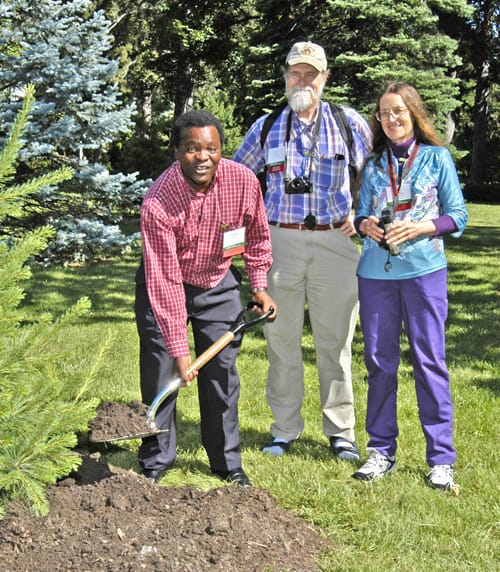
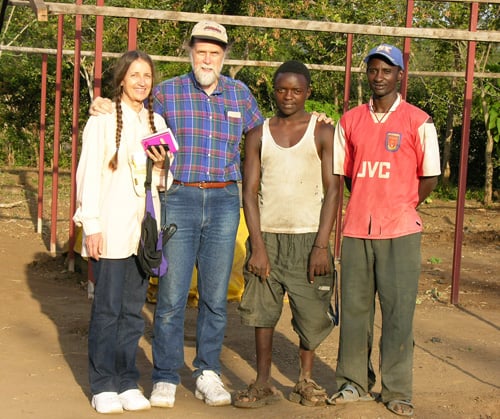
Community Tree Planting Groups
The work of the ABCP has only been possible because of the commitment and interest of many dedicated people who have assisted in the replanting projects for the seedlings produced in the ABCP nursery every year. These volunteers have been numerous, from private landowners to numerous local schools, to municipal organizations, to like-minded conservation oriented groups. The sections below cover some of these groups and describe their environmental efforts.
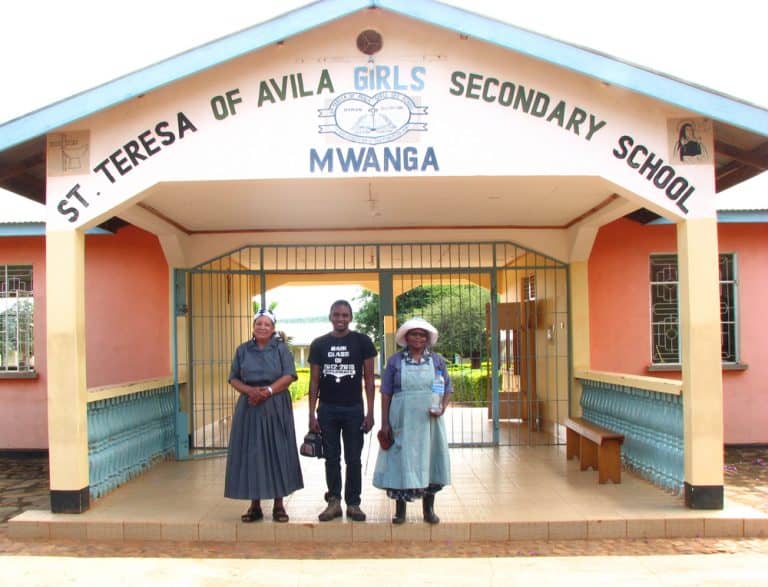
SCHOOL GROUPS
The ABCP supplies area schools with a variety of tree seedlings, and many take an active interest in providing protected planting sites for African blackwood trees.
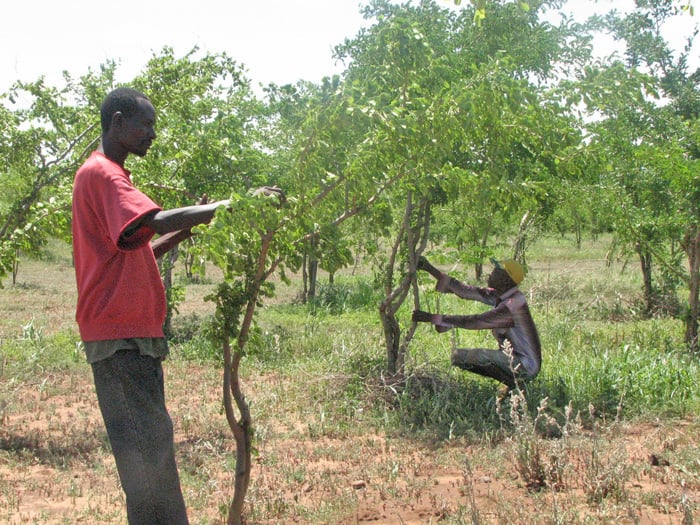
COMMUNITY GROUPS
Several community groups have instituted programs to oversee the replanting and maintenance of Dalbergia melanoxylon on community land holdings. .
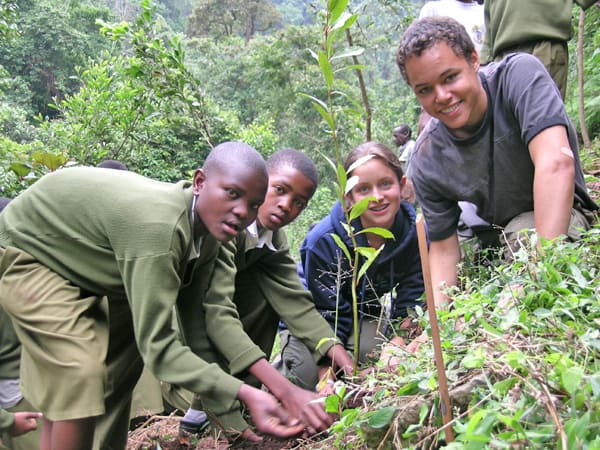
CONSERVATION ON KILIMANJARO
The ABCP provides seedlings for the forests of Mt. Kilimanjaro, a crucial watershed for a large area of northern Tanzania.
Below: Cyril and Elizabeth measure Dalbergia melanoxylon trees planted at the ABCP nursery to record scientific data and establish a baseline for domestic cultivation of the species.
